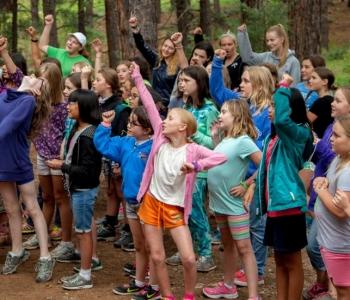How Troop Leaders Put the “Skills” in People Skills

“Where on earth did he get that idea?”
“I’ve said the same thing five times!”
“She never listens to me!”
Sound familiar?
Being a troop leader means being a team player, a negotiator, and a master communicator, among many other roles. And you’ll hone those skills as you work with girls and families whose communication styles are very different from yours. You’re bound to encounter an occasional misunderstanding, but how you approach a resolution is totally within your control and sets the tone for future interactions.
So how do you get what you need for you and your troop while maintaining strong and cordial relationships with the troop’s extended members? Borrow our Volunteer Experts’ favorite communication and negotiation tactics to get your point across effectively and move troop business forward!
Find common ground.
Viewing parents and caregivers as partners rather than adversaries will go a long way in resolving any disagreements or misunderstandings that come your way. Focusing on shared interests—in this case, the girls in your troop—helps create a more persuasive argument or pitch. For instance, if you need families to volunteer for an upcoming event, remind them that the event is their opportunity to help make a memorable experience for their girl.
“My mantra is that the girls come first, so if I am making a decision about something or considering how to respond to a parent, I think about how it potentially affects the girls in our troop or the individual troop member,” shares Denise Montgomery, a Junior troop leader in Girl Scouts of San Diego. “Keeping the girls first has been a good North Star.”
Listen. Really listen.
Put down your phone or paperwork and be fully present in the conversation. Focus on what someone is saying, versus thinking about how you’ll respond to their comments. By making people feel heard, they’ll feel like you understand where they’re coming from, even if you disagree with them.
But listening involves more than just hearing. Reading a person’s body language or tone of voice and subsequently adjusting your own goes a long way in flipping a tense conversation into a calm, productive one. A troop member or family member might say they’re OK with an activity, but folded arms and downturned eyes say otherwise. Sometimes it’s not what’s said, but how it’s said!
“When I speak to a girl or her parent, I am more aware of what and how I say something,” admits Trina Floyd, a Junior troop leader in Girl Scouts of Western Ohio. “I have an eclectic group of girls and appreciate how much they have affected my interactions with others.”
Be direct.
For some troop leaders, directly confronting a sticky situation can be straight-up uncomfortable, and that’s nothing to be ashamed of. Many of us have been told since we were young to “play nice” and that might mean softening our speech or assuring someone that something “isn’t a big deal” even when it is. But don't tiptoe around important troop matters or apologize for doing what you need to do for your troop; remember, you can be polite and still be assertive.
“Honesty and openness is important,” shares Trina. “I believe the best way to handle conflict is directly. I think it is best to hear both sides of the story separately and then bring the parties involved together to discuss the situation. While together, have each party think of the other’s perspective on the situation.”
Being direct also means setting clear expectations; you’ll save a lot of time and frustration by clearly outlining the role each family plays in the troop. “I’ve learned that if we’re specific when we ask for help or volunteers—lead a guacamole-making station, provide feathers and cardboard tubes for a project, provide snacks for a troop meeting—we get strong response,” says Denise. “People want to know what they are being asked to do, and that they can succeed at it.”
Focus on the positive.
Positive reinforcement goes a long way! “We discovered that people read our troop emails if we recognize people throughout them,” explains Denise. “We highlight names in bold when we are thanking people, whether for providing meeting snacks, leading an activity at a troop meeting, or volunteering on an outing. Thanking people doesn’t cost anything, and it makes people feel good and appreciated. It creates a positive cycle of people feeling good about supporting the troop and volunteering to provide more support in the future.”
And remember: actions speak louder than words
For troop families, you’re more than just the troop leader; you’re a real-life example of what it means to be a leader who lives by the Girl Scout Law. So stand strong, troop leader, and set that example! It may take some time before everyone falls in line, but you’ll garner respect...and maybe nab a few additional troop volunteers too.
For Anna Jochum, a troop leader in Girl Scouts of Southeastern Michigan, living the Girl Scout Law also means being fair to herself. “You can't please [everyone] all of the time and you will burn yourself out if you try. By all means, bend over backwards for the parents who keep up with troop news and help out when you ask for volunteers, but know where to set your limits. You are a volunteer, not a paid assistant.”
Remember, troop leader, that there’s a lot to be gained from both positive—and maybe less-than-positive—interactions with your troop and their families. Shine a positive light on every moment; in navigating the variety of personalities in your troop, you build resume-worthy people skills that you’ll always carry with you.





